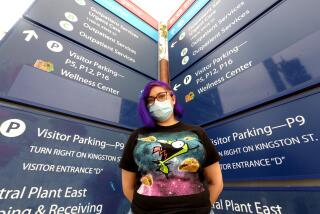L.A. Free Clinic to change name in honor of gift
The Los Angeles Free Clinic will change its name next month to the Saban Free Clinic in honor of a $10-million donation, the largest in the clinic’s 41-year history, from philanthropists Haim and Cheryl Saban.
The gift, which the clinic plans to announce today, will be used to create an endowment, said clinic co-director Abbe Land.
It comes almost 25 years after Cheryl Saban -- then a divorced, working mother of two with no health insurance -- sought care at the clinic’s Beverly Boulevard branch. The professionalism and kindness of the doctors and nurses impressed her deeply, she said.
“It seems really appropriate, and kind of ironic in a way, to be able to be so supportive of them when they were so supportive of me when I needed them,” Cheryl Saban said.
Two years after that first visit, Saban’s circumstances changed dramatically when she married Haim Saban, who made his fortune in the entertainment industry as the producer of the children’s show “Mighty Morphin Power Rangers” and is now chairman of Univision Communications Inc.
The couple are well-known in Southern California as philanthropists, donating a record $40 million to Childrens Hospital Los Angeles in 2003. They have long supported the free clinic.
The Los Angeles Free Clinic opened in a Fairfax Avenue storefront to treat teenagers who flocked to Hollywood during 1967’s “Summer of Love.” Today it operates four sites and serves as a medical home to about 21,000 patients a year. About 60% of its funding comes from government grants and health programs, the rest from donations.
It is part of a network of more than 40 private, nonprofit clinics that work in partnership with the county to provide preventive and primary care to the working poor. About a quarter of Los Angeles County’s population has no insurance.
Cheryl Saban found herself in that position when her earlier marriage ended.
“I went from having everything I needed to living week to week, hand to mouth,” she said.
At first, she said, a mix of guilt and shame at finding herself in such dire circumstances kept her from seeking help for a viral infection and extreme fatigue. She’d imagined that free clinics were for people who didn’t work -- a stereotype she abandoned when she saw that her fellow patients were working as hard as she was to raise their children and stay afloat.
Having grown up with universal healthcare in Israel, Haim Saban said it was incomprehensible to him that in the world’s richest nation, more than 40 million people had no medical insurance.
“We go through life, we need food, we need water and we need doctors,” he said. “You have those three things, you’re ahead of the game.”
The endowment will give the clinic “a little breathing space,” said co-director Land, helping it weather the ups and downs of the economy and government funding.
“It’s a recognition that we are a significant institution in the community,” she said. “We’ve been around for 40 years, providing for healthcare needs as they changed. We’re a good investment.”
More to Read
Sign up for Essential California
The most important California stories and recommendations in your inbox every morning.
You may occasionally receive promotional content from the Los Angeles Times.










